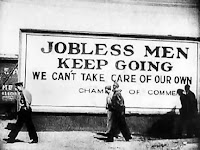I recently found out the next book in a science fiction series I have been reading has been published. The series is called the Emberverse series, the author is S.M. Stirling, and the first book is Dies the Fire.

The basic premise is that all technology stops working, sending the world back to the Stone Age. The book talks about how 99% of the world dies within a year, because the loss of technology causes anarchy and prevents people from getting food. Since most people, especially city dwellers and suburbanites, do not have their own source of food or potable water, they starve when the system collapses.
After this gritty, chaotic time, though, a more halcyon period begins, as only a small percentage of the population is left (though some small pockets of violence still exist). The book goes on to describe what happens to these remaining people, who are mostly people who live in rural areas and who are not as dependent on centralized food production. Specifically, it follows the pursuits a few tribe-like societies and their plight to defeat a would-be warlord and his ex-gangster minions. A few characters from Stirling’s other book series, the Nantucket series, also make cameo appearances.

This got me thinking: If the current recession worsened, could it cause a similar disaster scenario? Though recessions and depressions have happened many times before in almost every country, globalization is relatively new, and its effects on the current economic problems may be enormous. If globalization creates a kind of negative feedback, the effects of the recession will be minimal and our economy will soon bounce back. But if it acts as positive feedback, the recession will spiral out of control and plunge the world into a terrible depression.
But, will this create the kind of disaster scenario described in Stirling’s books? Remember that the US has been through many depressions before. We suffered though a about 1 depression every decade in the 1800s, and we have also had a few modern economic paroxysms, which we have recovered from as well. Even in the Great Depression, in which millions of people lost their jobs, the government did not collapse and the effects were not permanent. For our government and our infrastructure to completely collapse, we would probably have to be attacked by a foreign nation—mass unemployment, though unfortunate, is a far cry from anarchy.
The only place where this kind of scenario could occur is in an area like the Balkans or the Middle East. If one country’s government is weakened by the recession, a neighboring country could invade it, creating chaos. The US, though, has no belligerent or militaristic neighbors, making the scenario unlikely.
But preparation for this kind of scenario should not be held in abeyance—it is something we should continue to watch out for and be aware of. It may be closer than we think.

No comments:
Post a Comment